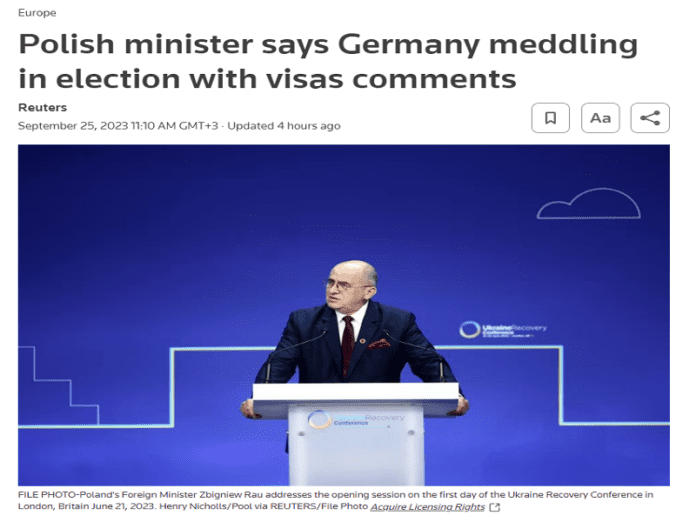Polish-German ties are deteriorating in parallel with Polish-Ukrainian ones after that country’s Foreign Minister just accused Chancellor Olaf Scholz of meddling in its elections. The German leader demanded that Poland clarify the visa scandal from earlier this month in which it was alleged that several hundred thousand people from the Global South illegally purchased visas from its consulates. Warsaw claimed that the real number is just a few hundred but Scholz hinted that he might impose border controls.
His innuendo provoked Foreign Minister Zbigniew Rau to tweet the following condemnation:
“The latest statement by German Chancellor Olaf Scholz violates the principles of sovereign equality of states, which is the foundation of good neighborly relations and friendly cooperation with Poland, declared by the government of the Federal Republic of Germany in the 1991 treaty with Poland. The competences of the German Chancellor clearly do not apply to the proceedings pending in Poland.
Statements on this matter indicate an attempt to interfere in the internal affairs of the Polish State and the ongoing election campaign in Poland. In the name of good bilateral relations, I appeal to the German Chancellor to respect Poland’s sovereignty and refrain from making statements that harm our mutual relations.”
This is an extremely serious allegation, but he has a solid point for the reasons that’ll now be explained.
Whatever doubts Scholz might have about the Polish authorities’ claim that the number of people who illegally purchased visas from their consulates should have been shared discretely through the appropriate diplomatic channels per protocol. By publicizing his concerns, he lent credence to the opposition’s speculation that they’re lying, which could influence voters’ perceptions ahead of the next elections on 15 October.
For as much as Scholz thought that he’d help oust the ruling party through these means, his meddling might actually backfire if it inspires Poles to vote for them out of patriotism to foil Germany’s regime change plot. The incumbents consistently claimed that Berlin backs the opposition, though that could have been dismissed as election rhetoric until now since nobody can any longer honestly deny that this is the case. Average Poles will certainly keep this in mind when they go to the polls.
As for outside observers, they now have grounds for considering whether there’s a hidden German hand behind the latest Polish-Ukrainian dispute like Deputy Foreign Minister Arkadiusz Mularczyk recently speculated. After all, if Germany is openly meddling in the next Polish elections like Scholz’s remark proves as was explained, then it therefore follows that it’s probably meddling through more hidden means too.
The takeaway from Rau’s tweet is that Poland will now call Germany out for its unfriendly policies even if this threatens to further weaken European unity. The combined effect of his country’s deteriorating relations with its two largest neighbors is the impression that it’s either gone rogue or they’re teaming up against it. Regardless of whichever interpretation one subscribes to, the fact of the matter is that Poland has suddenly become the center of continental attention in the run-up to its next elections.







